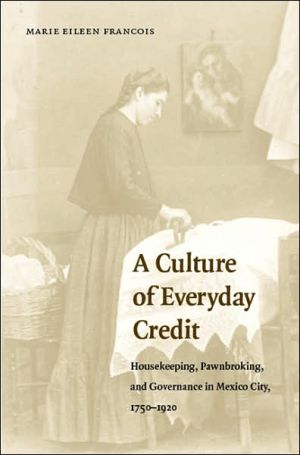

 |

|

Sold Out
Book Categories |
Pawning was the most common credit mechanism in Mexico City in the nineteenth century. A diverse, largely female pawning clientele from lower- and middle-class households regularly secured small consumption loans by hocking household goods. A two-tiered sector of public and private pawnbrokers provided collateral credit. Rather than just providing emergency subsistence for the poor, pawnbroking facilitated consumption by Creole and mestizo middle sectors of Mexican society and enhanced identity formation for those in middling households by allowing them to cash in on material investments to maintain status during lean times. A Culture of Everyday Credit shows how Mexican women have depended on credit to run their households since the Bourbon era and how the collateral credit business of pawnbroking developed into a profitable enterprise built on the demand for housekeeping loans as restrictions on usury waned during the nineteenth century.
Pairing the study of household consumption with a detailed analysis of the rise of private and public pawnbroking provides an original context for understanding the role of small business in everyday life. Marie Eileen Francois weighs colonial reforms, liberal legislation, and social revolution in terms of their impact on households and pawning businesses.
Based on evidence from pawnshop inventories, censuses, legislation, petitions, literature, and newspapers, A Culture of Everyday Credit portrays households, small businesses, and government entities as intersecting arenas in one material world, a world strapped for cash throughout most of the century and turned upside down during the Mexican Revolution.
“Francois addresses an important issue that has never received much attention. She paints a vivid picture of an urban commerce dominated by women and made possible by the credit secured through pawnbroking. One of the works’ strengths is its multidisciplinary approach; it combines business and gender history, which should make it appealing to a wider variety of scholars. It is highly recommended.”
—Jeremy Baskes, The Historian
Login|Complaints|Blog|Games|Digital Media|Souls|Obituary|Contact Us|FAQ
CAN'T FIND WHAT YOU'RE LOOKING FOR? CLICK HERE!!! X
 You must be logged in to add to WishlistX
 This item is in your Wish ListX
 This item is in your CollectionA Culture of Everyday Credit: Housekeeping, Pawnbroking, and Governance in Mexico City, 1750-1920
X
 This Item is in Your InventoryA Culture of Everyday Credit: Housekeeping, Pawnbroking, and Governance in Mexico City, 1750-1920
X
 You must be logged in to review the productsX
 X
 X

Add A Culture of Everyday Credit: Housekeeping, Pawnbroking, and Governance in Mexico City, 1750-1920, Pawning was the most common credit mechanism in Mexico City in the nineteenth century. A diverse, largely female pawning clientele from lower- and middle-class households regularly secured small consumption loans by hocking household goods. A two-tiered s, A Culture of Everyday Credit: Housekeeping, Pawnbroking, and Governance in Mexico City, 1750-1920 to the inventory that you are selling on WonderClubX
 X

Add A Culture of Everyday Credit: Housekeeping, Pawnbroking, and Governance in Mexico City, 1750-1920, Pawning was the most common credit mechanism in Mexico City in the nineteenth century. A diverse, largely female pawning clientele from lower- and middle-class households regularly secured small consumption loans by hocking household goods. A two-tiered s, A Culture of Everyday Credit: Housekeeping, Pawnbroking, and Governance in Mexico City, 1750-1920 to your collection on WonderClub |